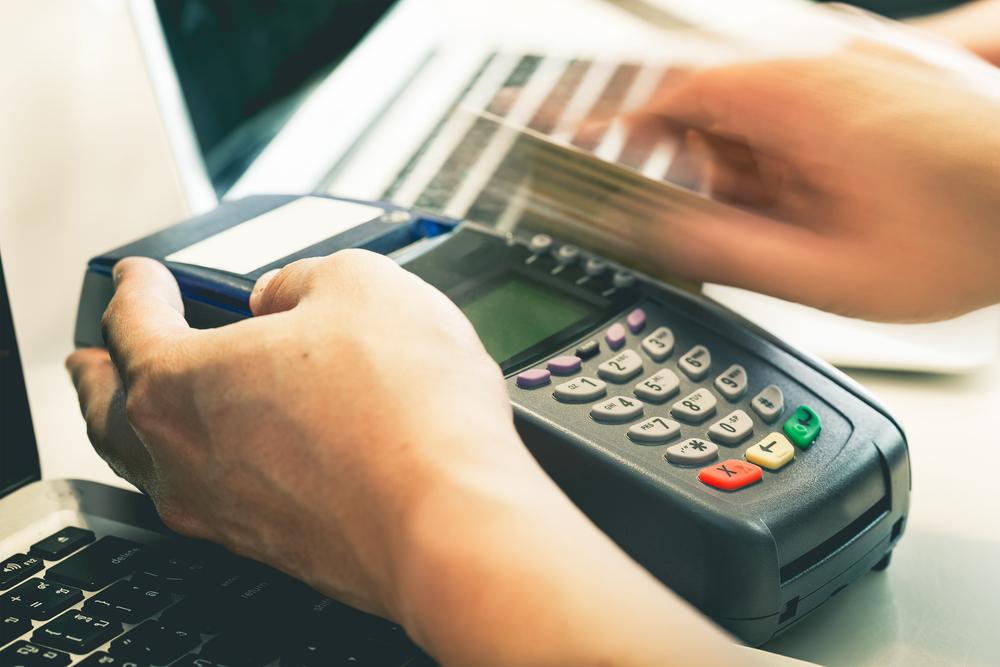Business News Daily provides resources, advice and product reviews to drive business growth. Our mission is to equip business owners with the knowledge and confidence to make informed decisions. As part of that, we recommend products and services for their success.
We collaborate with business-to-business vendors, connecting them with potential buyers. In some cases, we earn commissions when sales are made through our referrals. These financial relationships support our content but do not dictate our recommendations. Our editorial team independently evaluates products based on thousands of hours of research. We are committed to providing trustworthy advice for businesses. Learn more about our full process and see who our partners are here.
PayPal and Merchant Account Differences
PayPal can work as a merchant account, but it's technically a digital wallet. Learn the key differences between PayPal and merchant accounts to determine which is right for your business.

Table of Contents
A PayPal business account is a financial services account that allows business owners to accept payments from customers online and in person. Much like a merchant account, which is a business bank account that lets you collect and process credit card payments from patrons, PayPal business accounts offer businesses flexibility in how they process transactions. Here’s a closer look at how PayPal differs from a merchant account and how to determine which is right for you.
What’s the difference between PayPal and a merchant account?
PayPal differs from merchant accounts because it functions primarily as a digital wallet, with all of your business accounts – whether composed of proceeds from credit card transactions or cash deposits for paying vendors – combined into a single account.
Editor’s note: Looking for the right credit card processor for your business? Fill out the below questionnaire to have our vendor partners contact you about your needs.
PayPal is also different because, while it offers credit card processing services and can function similarly to a merchant account, it is more expensive than most major credit card processors.
In most cases, if your company processes a large volume of credit card transactions – such as retailers and restaurants – you will want to sign up with a dedicated small business credit card processing company other than PayPal, even if you plan to use PayPal for paying vendors.
Keep in mind, however, that it is possible to use both a PayPal business account and a merchant account. With both, the funds collected from customers are held in your merchant account until they’re transferred to your company’s bank account.
PayPal vs. merchant accounts at a glance
| PayPal for Business | Merchant account | |
|---|---|---|
| Best for | A new, small business that desires an easy-to-use payment processor | A high-volume business that would benefit from lower processing charges |
| Cost | 3.49% + $0.49 per online transaction | Varies by provider and may include tiered pricing |
| Payment methods | Credit and debit cards, PayPal, Pay in 4, Venmo, Google Pay | Credit and debit cards, Google Pay, Apple Pay, ACH |
| E-commerce payment processing | Credit and debit cards, PayPal Cash | Credit and debit cards, ACH |
| Point-of-sale systems | Zettle | Varies by provider |
What is PayPal?
PayPal is a financial services company that functions primarily as a digital wallet and money transfer service. The platform is typically used for sending money to friends and family, but you can use PayPal to invoice clients and receive payments, even if your business is primarily online.
PayPal business accounts can also be used as a payment processing platform, including credit and debit card transactions. When you process credit card transactions using PayPal, the proceeds – net of fees – are deposited into your company’s PayPal account.
How PayPal works
Getting set up with PayPal is straightforward. All you need to do is visit the website and sign up. You’ll get access to a digital wallet for your business as soon as you’ve registered, and can start sending and receiving funds immediately. You can also link existing bank accounts to the platform, though this can take a few days to confirm.
These are some of the services that you can access through PayPal once you’ve signed up:
- Invoicing: There’s no fee for sending invoices, but you’ll pay a small fee whenever customers pay an invoice through the platform.
- Payment processing: PayPal lets account holders accept credit and debit card payments, just like other processing companies. However, PayPal’s fees are higher than most companies’.
- Business loans: PayPal Business users can apply for a PayPal Business Loan to get a short-term small business loan. There’s also an online tool where you can check your eligibility without impacting your credit.
- Lines of credit: PayPal offers lines of credit, which are very similar to lines from banks or other alternative lenders. These can help your company with short-term funding needs, such as smoothing out seasonal expenses.
- Seller protection: PayPal’s seller protection guards against fraud and prevents chargebacks.
- Tax calculation tools: PayPal will help you calculate how much your business owes in sales tax for transactions processed through its platform.
Here’s a sneak peek at the PayPal tool:

Pros and cons of PayPal
These are some of PayPal’s pros:
- Setup is easy. You can typically set up PayPal without any development experience or outside resources.
- Flat-rate pricing is available. Many merchant accounts have tiered pricing, whereas PayPal is simpler and more transparent.
- The digital wallet tracks funds. PayPal is a digital wallet that holds all of your business’s funds deposited on the platform, including proceeds from credit card transactions.
- Conventional merchant accounts are robust. PayPal users get an account that works like a traditional merchant account, but the platform also offers your business more features and functionality – including a mobile credit card reader.
- Invoices are easy to create. PayPal has user-friendly invoicing that makes it easy to bill customers.
- Recurring payments are allowed. You can schedule payments to be issued automatically – either in dollars or other currencies.
- It can integrate with e-commerce platforms. PayPal can be integrated easily with several e-commerce platforms, including WooCommerce, Shopify, Wix, Depop and Squarespace.
These are some of the drawbacks of using PayPal:
- In-person options are limited. If you’re a retailer, PayPal Zettle is your only option for processing in-person credit card transactions.
- Other service providers are cheaper. PayPal increased its processing fees in August 2021, and is more expensive than many other top payment processing providers.
- You will pay a fee for chargebacks. If any of your transactions are disputed, your company will be charged a $20 fee for a chargeback – unless the transaction is covered by the seller protection policy.
- Business accounts can be suspended. You may not be able to process any payments if you have too many fraudulent transactions or chargebacks.
- Customization options are limited. PayPal is simple and easy to set up, but it’s not very good at bending to meet your specific needs.
- Not all shoppers like it. Some people don’t like using PayPal because they think it lacks security, or they don’t have accounts set up to send or receive money.
- Not all major payment methods are accepted. You can use PayPal Cash or debit and credit cards through PayPal, but some payment forms – such as Apple Pay – are not accepted.
What is a merchant account?
A merchant account is an account that you set up so your organization can accept the proceeds of transactions processed through a third-party payment processing company.
Most merchant accounts are set up directly with a credit card payment processing company to hold the proceeds of credit card transactions until they’re transferred – after fees have been deducted – to your business checking account at a bank or other financial institution.
How merchant accounts work
When a customer attempts to make a purchase with a credit card, the merchant services provider confirms the availability of funds and then authorizes the transaction. The customer’s funds are then transferred to the merchant account.
Once the funds are transferred, the payment processing company deducts its processing fees – typically from 3% to 5% of the transaction amount. Funds are then held in the merchant account until they’re transferred to your company’s checking account – typically within one or two business days.
While most merchant services providers charge between 3% and 5% of a transaction amount for processing – composed of a flat fee per transaction plus a percentage of the total – these fees vary by provider, transaction type and industry. Merchant services providers often charge additional costs, including application, setup and monthly fees.
Pros and cons of merchant accounts
Here are some of the upsides of working with merchant accounts:
- Your business collects payments efficiently. By using a dedicated merchant service provider, like Square or Stripe, you receive the proceeds of credit and debit card transactions – after fees – to your checking account within a day or two.
- Security is low risk. Only the last day or two of a business’s transaction receipts are held in conventional merchant accounts, so there’s less to lose in the event of a security breach; however, breaches are far less common than they are with digital wallets like PayPal.
- Your company can accept multiple currencies. Using a dedicated merchant services provider may allow you to accept payment in dollars or other currencies, though PayPal may still be a better choice for global payment processing.
- Customer support is strong. Payment processors have resources standing by to help if you encounter errors. As a digital platform, PayPal’s service resources are limited.
Here are some of the downsides of working with merchant accounts:
- Pricing can be variable. The pricing for merchant accounts varies widely by provider, and it’s based on numerous factors. This can make it difficult to judge exactly what you’ll pay in fees.
- Fraudulent transactions may occur. If you unknowingly process a fraudulent transaction from a customer, you may be responsible for refunding the charges.
- Transactions can be placed on hold. Transactions that appear dubious to the merchant services provider may have holds placed on them, preventing your company from accessing the proceeds until the payment settles.
- Accounting integrations are less robust. Conventional merchant accounts are only used for temporarily holding proceeds of credit or debit card transactions. You will need a separate account to handle cash purchases.
- Merchant account providers only accept some cards. The credit cards you can accept will vary based on which processing company you choose.
- Not all merchant account providers allow various payment types. Some processing companies are built for in-person transactions, such as in retail stores and restaurants, while others are geared for e-commerce – some work for both, but not all.








